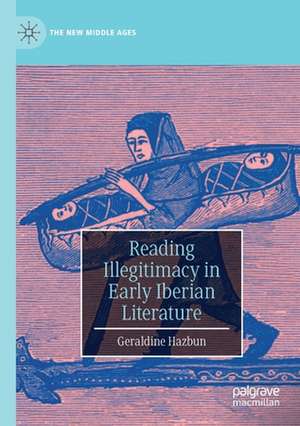Reading Illegitimacy in Early Iberian Literature: The New Middle Ages
Autor Geraldine Hazbunen Limba Engleză Paperback – 13 noi 2021
| Toate formatele și edițiile | Preț | Express |
|---|---|---|
| Paperback (1) | 386.22 lei 6-8 săpt. | |
| Springer International Publishing – 13 noi 2021 | 386.22 lei 6-8 săpt. | |
| Hardback (1) | 391.22 lei 6-8 săpt. | |
| Springer International Publishing – 13 noi 2020 | 391.22 lei 6-8 săpt. |
Din seria The New Middle Ages
- 20%
 Preț: 690.01 lei
Preț: 690.01 lei - 17%
 Preț: 457.58 lei
Preț: 457.58 lei - 20%
 Preț: 629.01 lei
Preț: 629.01 lei - 18%
 Preț: 782.42 lei
Preț: 782.42 lei - 15%
 Preț: 636.80 lei
Preț: 636.80 lei - 8%
 Preț: 537.27 lei
Preț: 537.27 lei - 20%
 Preț: 566.94 lei
Preț: 566.94 lei - 9%
 Preț: 626.77 lei
Preț: 626.77 lei - 20%
 Preț: 629.10 lei
Preț: 629.10 lei -
 Preț: 347.97 lei
Preț: 347.97 lei - 8%
 Preț: 563.62 lei
Preț: 563.62 lei - 9%
 Preț: 626.68 lei
Preț: 626.68 lei - 15%
 Preț: 524.70 lei
Preț: 524.70 lei - 8%
 Preț: 459.88 lei
Preț: 459.88 lei -
 Preț: 303.51 lei
Preț: 303.51 lei -
 Preț: 389.70 lei
Preț: 389.70 lei -
 Preț: 390.63 lei
Preț: 390.63 lei -
 Preț: 383.93 lei
Preț: 383.93 lei -
 Preț: 385.62 lei
Preț: 385.62 lei -
 Preț: 390.25 lei
Preț: 390.25 lei -
 Preț: 385.25 lei
Preț: 385.25 lei - 5%
 Preț: 712.81 lei
Preț: 712.81 lei - 15%
 Preț: 640.06 lei
Preț: 640.06 lei -
 Preț: 398.15 lei
Preț: 398.15 lei -
 Preț: 393.35 lei
Preț: 393.35 lei - 18%
 Preț: 725.13 lei
Preț: 725.13 lei - 18%
 Preț: 724.17 lei
Preț: 724.17 lei -
 Preț: 388.90 lei
Preț: 388.90 lei - 15%
 Preț: 698.30 lei
Preț: 698.30 lei -
 Preț: 386.39 lei
Preț: 386.39 lei -
 Preț: 387.38 lei
Preț: 387.38 lei -
 Preț: 384.48 lei
Preț: 384.48 lei - 18%
 Preț: 726.69 lei
Preț: 726.69 lei -
 Preț: 385.08 lei
Preț: 385.08 lei - 15%
 Preț: 639.14 lei
Preț: 639.14 lei -
 Preț: 388.72 lei
Preț: 388.72 lei -
 Preț: 389.11 lei
Preț: 389.11 lei -
 Preț: 387.20 lei
Preț: 387.20 lei - 15%
 Preț: 697.97 lei
Preț: 697.97 lei - 15%
 Preț: 640.24 lei
Preț: 640.24 lei - 15%
 Preț: 499.92 lei
Preț: 499.92 lei -
 Preț: 388.72 lei
Preț: 388.72 lei -
 Preț: 387.96 lei
Preț: 387.96 lei - 15%
 Preț: 579.20 lei
Preț: 579.20 lei -
 Preț: 391.40 lei
Preț: 391.40 lei - 15%
 Preț: 640.37 lei
Preț: 640.37 lei - 15%
 Preț: 641.71 lei
Preț: 641.71 lei -
 Preț: 384.70 lei
Preț: 384.70 lei
Preț: 386.22 lei
Nou
Puncte Express: 579
Preț estimativ în valută:
73.93€ • 80.33$ • 62.14£
73.93€ • 80.33$ • 62.14£
Carte tipărită la comandă
Livrare economică 21 aprilie-05 mai
Preluare comenzi: 021 569.72.76
Specificații
ISBN-13: 9783030595715
ISBN-10: 3030595714
Pagini: 271
Ilustrații: XII, 271 p. 1 illus.
Dimensiuni: 148 x 210 x 25 mm
Greutate: 0.37 kg
Ediția:1st ed. 2020
Editura: Springer International Publishing
Colecția Palgrave Macmillan
Seria The New Middle Ages
Locul publicării:Cham, Switzerland
ISBN-10: 3030595714
Pagini: 271
Ilustrații: XII, 271 p. 1 illus.
Dimensiuni: 148 x 210 x 25 mm
Greutate: 0.37 kg
Ediția:1st ed. 2020
Editura: Springer International Publishing
Colecția Palgrave Macmillan
Seria The New Middle Ages
Locul publicării:Cham, Switzerland
Cuprins
Chapter 1: The Scope of Illegitimacy.- Chapter 2: Epic Illegitimacy: the Cantar de Mio Cid and Las Mocedades de Rodrigo.- Chapter 3: Split Identity: Illegitimacy in the Romancero.- Chapter 4: Narrating Illegitimacy: the Novelas ejemplares.- Chapter 5: Lope de Vega’s Bastard Heroes: Pieces and Traces.
Recenzii
“From the point of view of a historian like myself who works on illegitimacy, this is a fascinating and valuable book. Hazbun has captured the essence of illegitimacy and the fact that it is ambiguous and can be reshaped by parents, children, families, and society. … Her well-written analysis of all these different texts makes the literature she is using accessible to non-literary scholars and to students who might be interested in exploring this challenging theme.” (Grace E. Coolidge, Speculum, Vol. 98 (4), October, 2023)
Notă biografică
Geraldine Hazbun is Professor of Medieval Spanish Literature at the University of Oxford and Ferreras Willetts Fellow in Spanish at St Anne’s College, Oxford, UK. She is the author of Treacherous Foundations: Betrayal and Collective Identity in Early Spanish Epic, Chronicle, and Drama (2009) and Narratives of the Islamic Conquest from Medieval Spain (Palgrave Macmillan, 2015).
Textul de pe ultima copertă
Reading Illegitimacy in Early Iberian Literature presents illegitimacy as a fluid, creative, and negotiable concept in early literature which challenges society’s definition of what is acceptable. Through the medieval epic poems Cantar de Mio Cid and Mocedades de Rodrigo, the ballad tradition, Cervantes’s Novelas ejemplares, and Lope de Vega’s theatre, Geraldine Hazbun demonstrates that illegitimacy and legitimacy are interconnected and flexible categories defined in relation to marriage, sex, bodies, ethnicity, religion, lineage, and legacy. Both categories are subject to the uncertainties and freedoms of language and fiction and frequently constructed around axes of quantity and completeness. These literary texts, covering a range of illegitimate figures, some with an historical basis, demonstrate that truth, propriety, and standards of behaviour are not forged in the law code or the pulpit but in literature’s fluid system of producing meaning.
Caracteristici
Utilizes an intersectional view of identity taking into account ethnicity and gender Considers normative and legal principles of propriety from a historical and literary perspective Argues that illegitimacy and legitimacy are closely interrelated ideas rather than opposing categories
